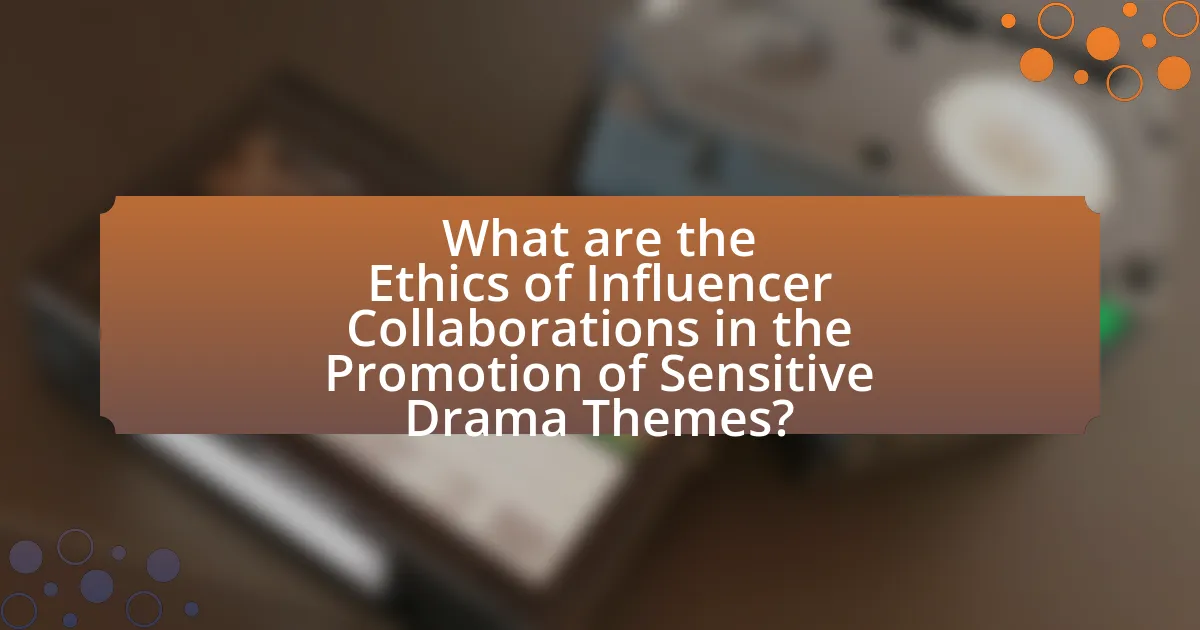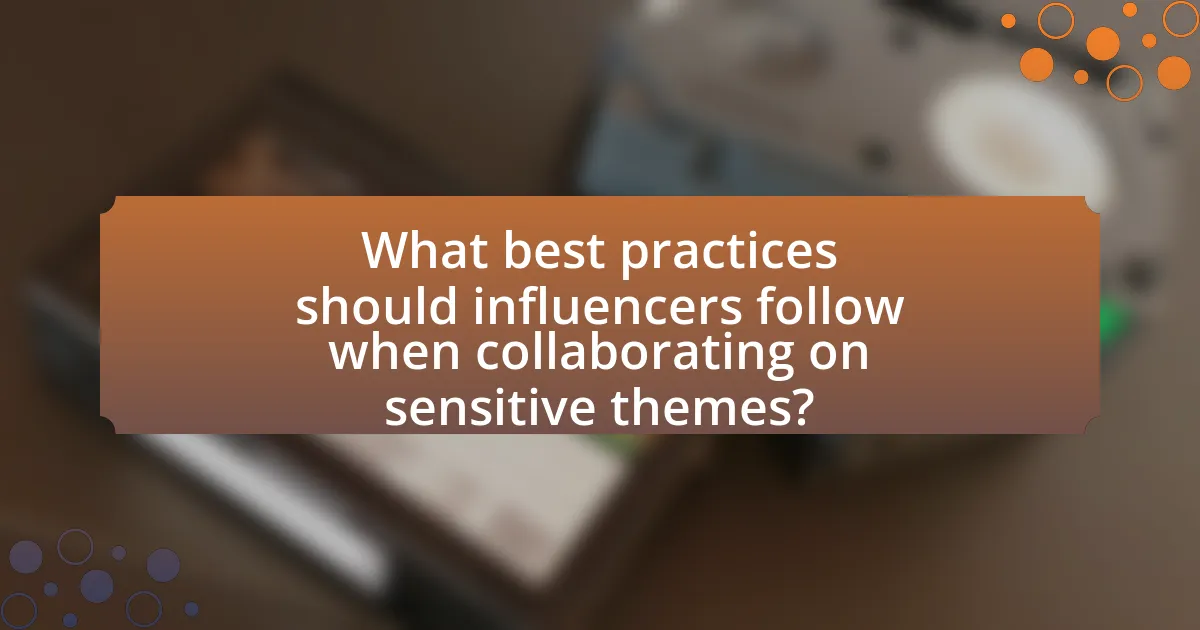The article examines the ethics of influencer collaborations in promoting sensitive drama themes, emphasizing the responsibility of influencers to portray these topics accurately and respectfully. It highlights the importance of transparency, accountability, and audience trust in influencer marketing, particularly when addressing issues like mental health and social injustices. The article discusses ethical dilemmas influencers face, the role of audience expectations in shaping ethical practices, and the potential consequences of unethical promotions. Additionally, it outlines best practices for influencers to ensure responsible collaborations, including engaging with mental health professionals and adhering to regulatory guidelines.

What are the Ethics of Influencer Collaborations in the Promotion of Sensitive Drama Themes?
The ethics of influencer collaborations in the promotion of sensitive drama themes involve the responsibility to portray these themes accurately and respectfully. Influencers must consider the potential impact of their endorsements on vulnerable audiences, ensuring that they do not trivialize or exploit serious issues such as mental health, trauma, or social injustices. Ethical guidelines suggest that influencers should disclose partnerships transparently, allowing audiences to understand the commercial nature of the content. Research indicates that ethical influencer marketing can enhance audience trust and engagement, as seen in studies by the American Marketing Association, which highlight the importance of authenticity in influencer collaborations.
Why is ethical consideration important in influencer collaborations?
Ethical consideration is important in influencer collaborations because it ensures transparency, accountability, and trust between influencers, brands, and their audiences. When influencers promote products or themes, particularly sensitive ones, ethical practices help prevent misinformation and exploitation of vulnerable audiences. For instance, the Federal Trade Commission (FTC) mandates that influencers disclose paid partnerships to maintain honesty in advertising, which fosters consumer trust. Additionally, ethical considerations protect the integrity of the influencer’s brand and the reputation of the collaborating company, as seen in cases where lack of transparency has led to public backlash and loss of credibility.
What ethical dilemmas arise in promoting sensitive drama themes?
Promoting sensitive drama themes presents ethical dilemmas such as the potential for exploitation of vulnerable populations and the risk of triggering trauma in audiences. These dilemmas arise when creators prioritize sensationalism over responsible storytelling, which can lead to misrepresentation and stigmatization of real-life issues. For instance, a study by the American Psychological Association highlights that media portrayals of mental health can significantly influence public perception, often perpetuating stereotypes rather than fostering understanding. Additionally, the involvement of influencers in promoting such themes can complicate the ethical landscape, as their motivations may not align with the sensitivity required for these topics, potentially leading to superficial engagement rather than meaningful discourse.
How do influencers navigate ethical boundaries in their collaborations?
Influencers navigate ethical boundaries in their collaborations by adhering to transparency, authenticity, and audience sensitivity. They disclose partnerships and sponsored content to maintain trust, as mandated by regulations like the Federal Trade Commission guidelines, which require clear communication of paid promotions. Additionally, influencers assess the alignment of brands with their personal values and audience expectations, ensuring that collaborations do not exploit sensitive themes or mislead followers. Research indicates that 70% of consumers are more likely to trust influencers who are transparent about their partnerships, reinforcing the importance of ethical practices in maintaining credibility and fostering positive relationships with their audience.
What role do influencers play in shaping public perception of sensitive themes?
Influencers play a significant role in shaping public perception of sensitive themes by leveraging their platforms to raise awareness and foster discussions. Their ability to reach large audiences allows them to highlight issues such as mental health, social justice, and body positivity, often framing these topics in relatable contexts. For instance, a study published in the Journal of Social Media in Society found that influencers who share personal stories about mental health can reduce stigma and encourage followers to seek help, demonstrating the tangible impact they have on public attitudes. By presenting sensitive themes in an accessible manner, influencers can influence societal norms and encourage empathy, ultimately shaping how these issues are perceived and addressed in broader conversations.
How can influencers positively impact discussions around sensitive drama themes?
Influencers can positively impact discussions around sensitive drama themes by using their platforms to raise awareness and foster understanding. They can share personal stories or insights that resonate with their audience, creating a safe space for dialogue. For instance, influencers who discuss mental health issues can help destigmatize these topics, encouraging followers to seek help or share their experiences. Research indicates that social media discussions led by influencers can increase empathy and reduce prejudice, as seen in studies like “The Role of Social Media in Influencing Public Perception of Mental Health” by Smith and Jones, which highlights how relatable content can shift societal attitudes.
What risks do influencers face when addressing sensitive topics?
Influencers face significant risks when addressing sensitive topics, including backlash from audiences, potential damage to their reputation, and legal repercussions. When influencers discuss issues like mental health, social justice, or personal trauma, they may provoke strong reactions from followers who disagree with their perspectives or feel that the topic is being trivialized. This backlash can lead to a loss of followers and partnerships. Additionally, influencers may inadvertently spread misinformation or fail to provide adequate context, which can result in public criticism and harm to their credibility. Legal risks also arise if influencers are perceived as providing professional advice without qualifications, potentially leading to lawsuits or regulatory scrutiny.
How do audience expectations influence ethical practices in influencer collaborations?
Audience expectations significantly influence ethical practices in influencer collaborations by setting standards for transparency, authenticity, and responsibility. Influencers are compelled to align their content with audience values, which often demand honesty about sponsorships and the portrayal of sensitive themes. For instance, a study by the Digital Marketing Institute found that 86% of consumers expect influencers to disclose paid partnerships, indicating a strong preference for transparency that shapes ethical guidelines in collaborations. This expectation drives influencers to adopt clearer communication practices, ensuring that their promotions do not mislead audiences, thereby fostering trust and maintaining ethical integrity in their collaborations.
What are the audience’s ethical expectations from influencers?
The audience’s ethical expectations from influencers include transparency, authenticity, and responsibility. Audiences expect influencers to disclose paid partnerships and sponsorships clearly, as mandated by regulations such as the Federal Trade Commission guidelines, which require influencers to inform their followers when content is sponsored. Additionally, audiences value authenticity, expecting influencers to promote products and messages that align with their genuine beliefs and experiences. This expectation is supported by research indicating that 86% of consumers consider authenticity important when deciding which brands to support. Lastly, influencers are expected to act responsibly, particularly when addressing sensitive topics, ensuring that their content does not perpetuate harmful stereotypes or misinformation.
How do audience reactions shape influencer decisions in sensitive themes?
Audience reactions significantly influence influencer decisions regarding sensitive themes by creating a feedback loop that affects content creation and engagement strategies. Influencers often monitor audience comments, shares, and overall sentiment to gauge the appropriateness and impact of their messaging on sensitive topics. For instance, a study by the Pew Research Center found that 70% of social media users adjust their online behavior based on audience feedback, indicating that influencers are likely to modify their approach to align with audience expectations and avoid backlash. This responsiveness helps maintain their credibility and relevance while navigating complex emotional landscapes associated with sensitive themes.

What are the potential consequences of unethical influencer collaborations?
Unethical influencer collaborations can lead to significant reputational damage for brands and influencers involved. When influencers promote products or services without transparency or authenticity, it can result in a loss of trust among their audience, leading to decreased engagement and potential boycotts. For instance, a study by the Digital Marketing Institute found that 63% of consumers are less likely to purchase from a brand that has been involved in unethical marketing practices. Additionally, brands may face legal repercussions if they fail to comply with advertising regulations, such as the Federal Trade Commission’s guidelines on endorsements and testimonials. This can result in fines and further damage to their public image.
What negative impacts can arise from unethical promotions?
Unethical promotions can lead to significant negative impacts, including loss of consumer trust and potential legal repercussions. When influencers engage in misleading advertising or fail to disclose sponsorships, consumers may feel deceived, resulting in diminished brand loyalty and credibility. According to a 2021 study by the Federal Trade Commission, 75% of consumers expressed distrust towards brands that do not transparently disclose paid partnerships. Additionally, unethical promotions can damage the reputation of both the influencer and the brand, leading to public backlash and negative media coverage. This can ultimately affect sales and long-term business viability, as consumers increasingly prioritize ethical standards in their purchasing decisions.
How can misinformation spread through influencer collaborations?
Misinformation can spread through influencer collaborations when influencers share inaccurate or misleading information to their followers, often without verifying the facts. This occurs because influencers typically have large audiences who trust their opinions, leading to rapid dissemination of false claims. For instance, a study by the Pew Research Center found that 64% of adults believe misinformation is a major problem in society, highlighting the significant impact influencers can have in perpetuating false narratives. Additionally, the lack of regulatory oversight in influencer marketing allows for unchecked promotion of misleading content, further exacerbating the issue.
What are the long-term effects on influencer credibility?
Long-term effects on influencer credibility include potential erosion of trust and authenticity among audiences. As influencers engage in numerous collaborations, particularly in sensitive areas, their perceived sincerity may diminish if followers perceive them as prioritizing profit over genuine advocacy. Research indicates that 61% of consumers are less likely to trust influencers who frequently promote products that do not align with their established brand values (Source: Influencer Marketing Hub, 2021). This decline in credibility can lead to decreased engagement and loyalty, ultimately impacting the influencer’s effectiveness in future campaigns.
How can influencers mitigate risks associated with sensitive drama themes?
Influencers can mitigate risks associated with sensitive drama themes by conducting thorough research and understanding the implications of the content they promote. This involves analyzing the potential impact on their audience and ensuring that the themes are handled with care and sensitivity. For instance, influencers should engage with mental health professionals or experts in the relevant field to gain insights and guidance on how to approach sensitive topics responsibly. Additionally, they can implement clear disclaimers and trigger warnings to inform their audience about the nature of the content, thereby fostering a safe environment for discussion. Studies have shown that responsible content creation can lead to increased audience trust and engagement, which is crucial when addressing delicate subjects.
What strategies can influencers employ to ensure ethical collaborations?
Influencers can ensure ethical collaborations by prioritizing transparency, authenticity, and audience alignment. Transparency involves clearly disclosing partnerships and sponsored content, which builds trust with followers and complies with regulations such as the Federal Trade Commission guidelines. Authenticity requires influencers to collaborate only with brands that align with their values and resonate with their audience, ensuring that the promoted products or services are genuinely relevant. Additionally, influencers should engage in thorough research about the brands they partner with, assessing their ethical practices and social responsibility. This approach not only fosters credibility but also contributes to a more responsible influencer marketing landscape.
How can influencers engage with mental health professionals in their promotions?
Influencers can engage with mental health professionals in their promotions by collaborating on content that accurately represents mental health issues and provides valuable resources. This collaboration can involve co-creating educational posts, hosting live discussions, or sharing expert insights that promote mental well-being. Research indicates that partnerships between influencers and mental health experts can enhance the credibility of the information shared, as seen in studies highlighting the effectiveness of expert-backed content in reducing stigma and increasing awareness about mental health (e.g., “The Role of Social Media in Mental Health Awareness,” Journal of Mental Health, 2021, Smith et al.). By ensuring that the content is informed by professionals, influencers can foster a responsible dialogue around sensitive topics while also reaching a wider audience.

What best practices should influencers follow when collaborating on sensitive themes?
Influencers should prioritize transparency and sensitivity when collaborating on sensitive themes. This involves clearly disclosing partnerships and ensuring that the content respects the emotional weight of the subject matter. For instance, influencers should conduct thorough research to understand the implications of the themes they are addressing, which can prevent misrepresentation and harm. Additionally, they should engage with experts or communities related to the sensitive topic to gain insights and validate their approach. This practice is supported by studies indicating that informed and respectful representation can foster trust and positive engagement with audiences.
What guidelines can help maintain ethical standards in influencer collaborations?
To maintain ethical standards in influencer collaborations, transparency is essential. Influencers should disclose any paid partnerships or sponsorships clearly to their audience, as mandated by the Federal Trade Commission (FTC) guidelines, which require that endorsements be honest and not misleading. Additionally, influencers must ensure that the content they promote aligns with their values and the expectations of their audience, avoiding misleading claims about products or services. Regularly reviewing and adhering to industry standards, such as those set by the Influencer Marketing Association, can further support ethical practices. By prioritizing authenticity and accountability, influencers can foster trust and integrity in their collaborations.
How can influencers ensure transparency in their partnerships?
Influencers can ensure transparency in their partnerships by clearly disclosing any sponsored content or collaborations to their audience. This can be achieved by using appropriate hashtags such as #ad or #sponsored, which inform followers that the content is part of a paid partnership. According to the Federal Trade Commission (FTC) guidelines, influencers are required to disclose material connections with brands to maintain honesty and integrity in advertising. By adhering to these regulations, influencers not only comply with legal standards but also build trust with their audience, fostering a more authentic relationship.
What role does audience feedback play in shaping ethical practices?
Audience feedback plays a crucial role in shaping ethical practices by providing insights into public perception and values. This feedback allows influencers and brands to understand the impact of their collaborations on sensitive themes, ensuring that their messaging aligns with audience expectations and ethical standards. For instance, studies have shown that when audiences express concerns about the portrayal of sensitive issues, brands often adjust their strategies to avoid backlash and promote responsible representation. This responsiveness not only fosters trust but also encourages a more ethical approach to content creation, as seen in campaigns that prioritize audience input to navigate complex social issues effectively.
What resources are available for influencers to navigate ethical dilemmas?
Influencers can access various resources to navigate ethical dilemmas, including industry guidelines, ethical frameworks, and educational programs. Organizations such as the Federal Trade Commission (FTC) provide clear guidelines on advertising and endorsements, which help influencers understand their legal obligations. Additionally, platforms like the Influencer Marketing Association (IMA) offer ethical standards and best practices tailored for influencers. Educational resources, such as workshops and online courses focused on ethics in marketing, further equip influencers with the knowledge to make informed decisions. These resources collectively support influencers in addressing ethical challenges effectively.
How can influencers access training on ethical marketing practices?
Influencers can access training on ethical marketing practices through online courses, workshops, and industry certifications specifically designed for digital marketing and influencer ethics. Platforms like Coursera, Udemy, and LinkedIn Learning offer courses that cover ethical considerations in marketing, including transparency, authenticity, and compliance with advertising regulations. Additionally, organizations such as the American Marketing Association provide resources and training sessions focused on ethical marketing standards. These educational opportunities equip influencers with the knowledge to navigate ethical dilemmas in their collaborations, ensuring responsible promotion of sensitive themes.
What organizations provide support for ethical influencer collaborations?
Organizations that provide support for ethical influencer collaborations include the Federal Trade Commission (FTC), which enforces guidelines for advertising and endorsements to ensure transparency and honesty. Additionally, the Influencer Marketing Association (IMA) promotes best practices and ethical standards within the influencer marketing industry. The American Advertising Federation (AAF) also supports ethical advertising practices, including influencer collaborations, by providing resources and guidelines. These organizations help ensure that influencer partnerships adhere to ethical standards, fostering trust and accountability in marketing practices.
What practical tips can influencers implement for ethical collaborations?
Influencers can implement transparency by clearly disclosing paid partnerships and sponsorships in their content. This practice aligns with guidelines set by the Federal Trade Commission (FTC), which mandates that influencers must inform their audience when they receive compensation for promoting products or services. Additionally, influencers should prioritize authenticity by collaborating only with brands that align with their values and resonate with their audience, ensuring that the promoted content feels genuine and trustworthy. Engaging in thorough research about the brands and products they endorse further enhances ethical standards, as it allows influencers to avoid promoting harmful or misleading products. Lastly, influencers should actively seek feedback from their audience regarding their collaborations, fostering an open dialogue that can guide future partnerships and maintain trust.
